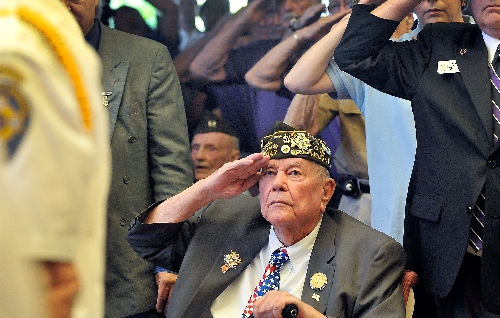Cemetery brings tears, tributes
Two grown women and a teenage girl carry a baby named Jasmine through a cemetery.
They sit on the lawn. Monday afternoon. Remove the infant from her carrier.
The oldest of the women, Amy Froisland, holds the baby upright over a gravestone. The two younger ladies, Froisland's daughter and granddaughter, snap photographs.
"I'm here, grandpa," Froisland says aloud, as if the baby were speaking. "I'm sorry I never met you."
Gerald Froisland was Amy's husband. He had served 24 years in the U.S. Army before they met in 1977 in her native Philippines. They both worked at Clark Air Force Base then.
Gerald, a communications specialist, died in 2003 at age 70. He served on the front lines in Korea and Vietnam, Froisland says.
He was a small man, maybe 5 feet, 5 inches tall, but that did not make him weak. "He was a very strong person," Froisland says.
Scenes such as this one play out again and again Monday at the Southern Nevada Veterans Memorial Cemetery in Boulder City.
While Memorial Day sales and family barbecues capture the attention of others, these people come to honor the dead.
Hundreds visit the grave sites of veterans, whether those men and women served in long ago wars or in more recent conflicts, whether they were killed in combat or died in old age.
"We need to have Memorial Day 365 days a year," Gov. Jim Gibbons tells a crowd there.
He and other political leaders spoke of honor, of sacrifice, of freedom.
The cemetery is generally set up in such a way that those who died at roughly the same time are buried near one another.
A section by the front gates, for example, has veterans who died in the 1990s. It seems to be mostly World War II veterans who died in old age, but casualties of the first Gulf War probably are there, too.
In the middle of the cemetery are those who died in the early 2000s. There were no wars then, so it is largely filled with the elderly who served long ago. In this section rests the gravestone of a man who died on Sept. 10, 2001.
Irwin Lieberman was 82 years old. His gravestone said he had been awarded a Purple Heart. He served in the Army in World War II.
He never knew of the 9/11 attacks and the way the world changed that day, the way this cemetery began to take on more and more of the young buried back toward the rear.
Back there, the graves are all more recent. There are vets who served in Korea, who served in Vietnam, and who lived long past those wars.
There are many graves of the casualties of Iraq and Afghanistan. Young men largely, buried between the vets who lived into old age.
Atop one of the newest graves on Monday, so new it did not yet have a permanent marker, sits a man.
He wears brown shorts and tennis shoes. A UFC cap covers his shaved head. He has a neatly trimmed reddish beard that hangs six inches down from his chin.
He has muscular arms the size of roasted hams that stick out from beneath a red tank top that says "Team Punishment" on the back. His arms are covered in black tattoos.
This man sits cross-legged atop the new grave with his elbows on his knees. He is crying. He does this for half an hour, pausing sometimes to drink from his water bottle or to wipe away tears. He places a piece of a shrub on the site.
He crawls to his knees after awhile and bends down to kiss the temporary stone that identifies the grave. "Carter," is the only word on the stone, written in black marker.
Later on, after the man walks away and sits on a bench to clear his head, he says his name is David McCune.
He is 48 years old, the president of the Laborers Union Local 872. The grave belongs to his best friend, Daniel Carter, who died of lung cancer in March.
"Danny was a hard man," McCune says. "But he was a fair man."
Carter's obituary says he had served in the Army in the 1980s. He worked for a defense contractor after that, and ended up as general foreman for Southern Nevada Paving.
That's how he and McCune met 15 years ago. McCune says they did not get along at first. Carter was a black man, and McCune, with his shaved head, long beard and tattooed arms, would look at home in a heavy metal music video or a scary comic book.
But very soon, McCune says, they came to be good friends.
"You know when you meet somebody and you just have that connection?" he says. That's how it was with him and Carter, who he says was like a brother.
And so, not too long after Carter died, McCune bought a plant called pink breath of heaven because the name sounded so nice. He planted it in his backyard.
He clips a piece from this plant every time he visits Carter's grave site and places it there to honor his friend, the U.S. Army veteran.
Contact reporter Richard Lake at rlake@reviewjournal.com or 702-383-0307.
Politicians and public honor veterans on Memorial Day
Memorial Day ceremony at Southern Nevada Veterans Memorial Cemetery


















